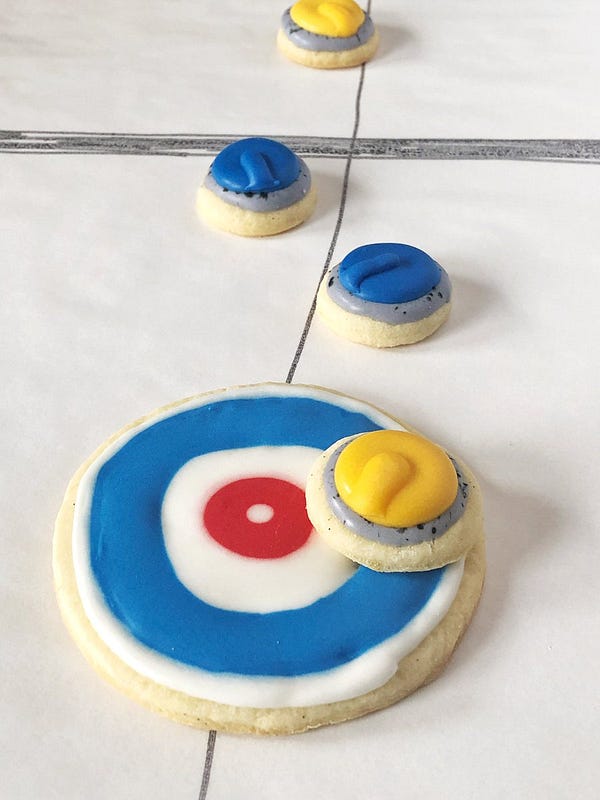
(For the uninitiated: tradition says that each game begins and ends with each player shaking the hands of all competitors; first your opponents, then your own teammates.)
Every once in a while a Scotties or Brier or championship converts some competitors into flu patients. They play ‘em during peak season. You then see elbow taps or fist bumps amongst the players when they greet each other.
Scott from Action Cookbook wrote a nice newsletter about handshakes and I think I’d like to echo the sentiment: let’s hold off with handshakes for a while.
(It’s not just my idea. Oakville Curling Club formally suggested their members forgo them.)
It’s tough to buck tradition, and even if COVID-19 wasn’t a serious threat, hand-on-hand contact is still the Autobahn for microorganisms. You never know what someone has, and even though you’re still in close proximity with greetings, this can still be done in hygienic fashion.
The importance of the handshake is to greet/acknowledge, and in many cases, meet those you are playing. Introduce yourselves, and say their names back. Consider it a little pop quiz when the game is over — repeat their name and say good curling, per usual. And be sure they know you’re talking to them. This is the downside. The handshake is a foolproof way of locking in someone’s undivided attention for a split-second. The other downside, I suppose, would be that onlookers can’t quite tell when a game is conceded. I guess put your hand up and do a half-wave.
If this works out, maybe we can instill new curling traditions. But if you have to shake hands, for the love of pebbled ice, do it with your gloves/mittens on.
Speaking of germs, I assume the world women’s curling championship will go off without a hitch next week in Prince George, BC. The WCF and Curling Canada aren’t worried, even with teams from Italy, South Korea, Japan and China flying in (I assume they’ve already flown in, ‘cause they’re not getting there now).
And now for the Brier stuff. As much as the preliminary pools yielded wonderful storylines and electric shots, the championship pool was a bloodbath. Eight teams entered and … seven teams exited, which meant tiebreakers galore on Saturday.
Predictably none of the tiebreaker teams made it onto the podium (Northern Ontario made it to the 3-4 game then ran out of gas) and it was Newfoundland, who took the medium-length way to the championships, running through the brute force of Northern Ontario, the unbridled enthusiasm of Saskatchewan and the robotic precision of Alberta to their third Brier in four years.
I feel bad for Alberta and Brendan Bottcher, because he’s entering the Buffalo Bills/Atlanta Braves friendzone of championships. (Although the Braves did win one, so.) It’s important to keep perspective: he’s 28 and has made the Brier final three times. He’s lost twice to Brad Gushue, who at that age had made just one Brier final. (As well as an Olympic gold as a fourth) and zero Grand Slam titles, compared to Bottcher’s three to date. Nobody doubts he’ll be back and become a Brier champion at some point, but as we know how these things go, nobody gets their “turn” at being champion. Gushue, in particular, didn’t get the trophy until his 14th Brier, at age 36.
Digging deeper, and I just went back to 2000, only two skips won a Brier under the age of 35: Brad Jacobs (26) and Jean-Michel Ménard (30). The median age of the winning skip was 41. Just so you remember the longevity of the sport, male skips don’t peak until their late 30s.
So yeah, he’s got plenty time. (So does Matt Dunstone and Saskatchewan, who is 24.) However Bottcher does have to beat either Kevin Koe or survive the wild card game.
• Pittsburgh’s dedicated ice is finally ready and they opened registration for a May bonspiel. Congrats to everybody over there. I still don’t know why you didn’t go with black and yellow handles.
• Club nationals are going on this week at the Potomac Curling Club (Washington DC), and a webstream exists.
• [cookie monster voice]:




Is American club curling more “traditional” than Canadian club curling? I don’t think I’ve ever shaken hands with my own teammates while playing in New Brunswick, Ontario, or B.C. American curling always sounds awesomely quirky.